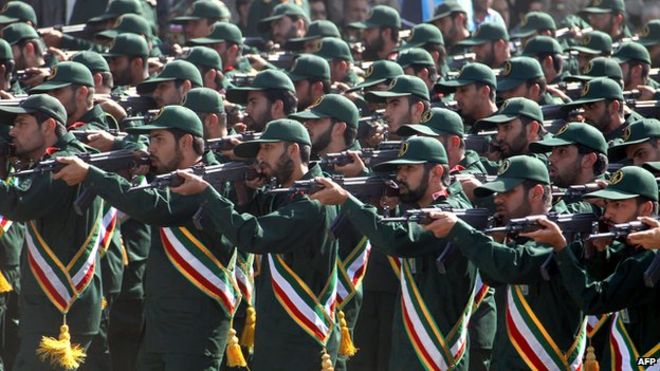The Trump administration is reportedly considering using an executive order to officially recognize the Iranian Revolutionary Guard Corps, a complex military and political machine within Iran, as a ‘terrorist organization’, according to Reuters.
This potential classification would almost certainly further complicate the already strained relations between the U.S. and Iran.
Readers recognize the Iranian Revolutionary Guard Corps (IRGC) as the umbrella organization for the infamous ‘Quds Force’, Iran’s special operations and intelligence apparatus. The Quds Force, led by Major General Qasem Suleimani, has a long track record of covert operations against the United States and American interests abroad.
Suleimani most notably led the Quds Force throughout the brutal Iraqi sectarian civil war. It has been reported that his intelligence officers and fighters supplied the Iraqi Shia insurgency with the weapons and means to inflict great casualties on Sunnis and American soldiers.
Specifically, Iran and its proxies were connected with the Explosively Formed Penetrator (EFP), which caused devastating damage to American personnel even in their most armored vehicles.
But the Quds Force and Suleimani have long been acknowledged for their activities abroad. In 2007 the U.S. Treasury Department labeled them a terrorist supporter for connections with the Taliban. Suleimani himself was behind a failed assassination attempt on the Saudi Ambassador to the United States in 2011.
Labeling the entirety of the IRGC as ‘terrorist’ would have greater implications for U.S.-Iranian foreign policy, and move the two countries closer to a state of open hostilities.
The IRGC goes far beyond being the parent organization to the Quds Force. It is deeply intertwined with overall Iranian political, military, and economic systems. Originally established as a bulwark against a potential state military coup, the IRGC reports directly to the Supreme Leader, circumventing even the president.
Iran has been labeled by the State Department as a ‘state sponsor of terrorism’ since 1984. With it have come a number of sanctions, but none that have prevented the U.S. from dealing with Iranian leadership directly.
President Trump has made his opposition to the ‘Nuclear Deal’ a cornerstone of his Iranian policy. National Security Adviser Michael Flynn put Iran ‘on notice’ last week after a recent missile test. Iran was included among the seven nations subject to the Trump ‘Travel Ban’, which Iran has reciprocated since with its own version of a travel ban for Americans.
Calling the IRGC a terrorist group could be interpreted as designating the entire regime as a terrorist organization itself, guaranteeing worsening diplomatic relationships as the various proxy wars throughout the Middle East with deep Iranian involvement show no sign of abating.
Already have an account? Sign In
Two ways to continue to read this article.
Subscribe
$1.99
every 4 weeks
- Unlimited access to all articles
- Support independent journalism
- Ad-free reading experience
Subscribe Now
Recurring Monthly. Cancel Anytime.











COMMENTS